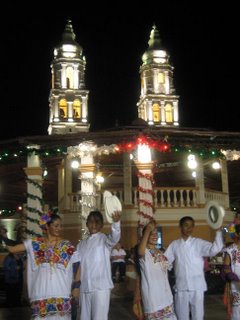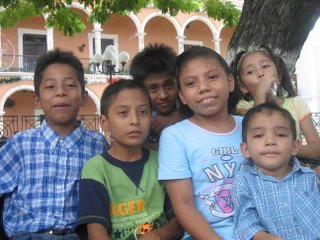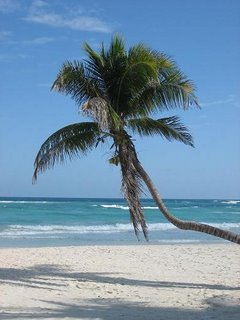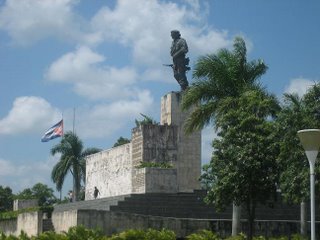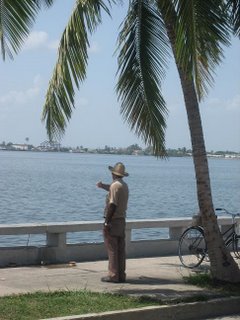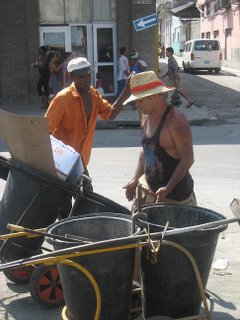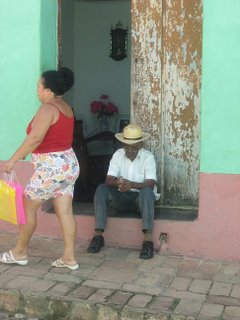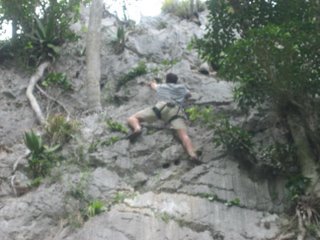No es fácil – It is not easy: is the phase used by Cubans to describe the daily struggle. And certainly I have to agree it is not easy (but where is it). I will not turn this discourse into an economic report nor render judgement on Cuban socialism, for neither I am qualified after such a brief glimpse into Cuban life. Rather I will try to confine this to anecdotal narratives from countless conversations and impressions gathered over the past weeks. The average Cuban earns between 10 and 30 dollars, which translates into 240 to 720 Cuban pesos (1 to 24 exchange rate). Even without paying rent (most Cuban “own” their home or rather receive permission by the government to live there for free) this amount does not suffice to survive let along buy clothes, fix things in the house or enjoy life. Every Cuban received a monthly food ration free form the government, which they pick up at a certain store and includes basics such as rice, beans and a bit of meat. This allowance will last about 2 weeks thereafter you are on your own and have to use your Cuban pesos (or dollar convertibles) to buy the rest. The problem with the Cuban peso is that it is not very useful. In Cuba there are two types of stores, the ones that sell in Cuban pesos (you can easily spot them by the empty shelves or the long line of people) and dollar stores (which are similar to Western stores both in terms of selection and price). Obviously, one does not get very far with 10-30 dollar per month in these dollar stores (I once spent 10USD on groceries that lasted me for 3 meals). So the Cuban has to scavenge hunt the peso stores (which sell at prices much lower) making the best of their pesos but any good somewhat special (soap, deodorant, clothes etc.) is simply not available for pesos. To make a long story short, as hard as you try you cannot survive off your government income. Depending on whom you ask, a Cuban family of 4 would require 60-100 dollars per month to get by. This is where the daily struggle (that Cuban love to talk, complain and laugh about) begins. The Cuban is a master of invention and has to think of ways to come up with the missing 40 dollars / month (this does not sound like much but is almost 2 monthly incomes). How does he do it? Before proceeding, I want to stress that the question is NOT, does he do it? Because without a doubt he does. No one in Cuba starves, even the poorest have a belly and look well fed and while not dressed in Armani suites, the typical Cuban is dressed nicely.
There are two ways to earn extra money on Cuba: legally and illegally. Most common legal ways include renting your home out to foreigners, producing something part time and selling it (e.g. food, art, furniture) or you are one of the many Cubans with relatives abroad receiving monthly support. Common illegal sources of income are renting your house to tourists illegally, trying to “obtain” a dollar or two from a clueless tourist, stealing at work and selling it on the side and sadly prostitution.
Let me offer some observations about the consequences of Cuban socialism. Cuba today is largely a race-equal society (the difference between rich and poor are far smaller than in developed countries), the government provides for free to everybody housing, food for about 2 weeks per month, the right to a job, free education from kindergarten to university, free health care and a country almost free of violence. All of these are substantial accomplishments that did not exist before the Cuban revolution and still do not exist in many developed countries.
However, what keeps Cuba’s economic progress limited is 1) massive inefficiencies due to government bureaucracy and 2) a work culture of “indifference.” Most jobs offer great security and it is almost impossible to get fired – attendance is frequently not required and even stealing often only results in a warning. Conversely, the person working diligently sees no (material) benefit. In such a culture it is of little surprise that nobody seems to work. Many people do not go to work at all, show up periodically or are physically present without making a contribution (it is not uncommon to see people sleeping at work or you being the only customer and 2 attendants patiently finishing their conversation before helping you 5 minutes later). How is a country to progress if a large portion of the work force simply is not productive? In addition to this economic inefficiency I should mention my natural reservations regarding the undemocratic nature of the government, the absence of free speech and political freedom, the police state and tragic human right abuses. This is justified by the government by necessity in the face of adversity to assure survival of the Cuban revolution.
Frequently Western media (U.S. propaganda in particular) cites low living standards relative to Western developed countries as evidence of failure of Cuban socialism. I submit that such a comparison is simply not fair (apples are compared to oranges) because every developing country’s living standards are far lower than in the developed world. Without rendering judgement (this will be up to the reader) let me just offer two approaches by with to measure Cuban progress.
1) Comparing Cuba today vs. the situation prior to the revolution in 1959. On this measure, the vast majority of Cubans are far better off. Pre-revolution Cuban was a racist country where a few U.S. companies and Mafiosi owned essentially all of Cuba and reaped the benefits of exploitation leaving the masses in poverty, uneducated and without access to medicine. Of course the former elite class (which has since fled to Miami) laments the old days.
2) Comparing Cuba today to the countries in the region which had a similar standard of living 50 years ago as a measuring stick to see whether Cuba has done better or worse than this peer group. On this measure there are pluses and minuses. No other country in the region has eradicated analphabetism, hunger, the housing problem, has the medical system Cuba has or offers the security that the Cuban streets provide. All of these are major milestones for a developing country. However, most of the other countries in the region offer greater political freedom, easier access to travel and greater economic mobility for the middle class.
I have tried to present this report as unbiased as possible and hope to have challenged the reader to think rather than jump to conclusions. As far as I am concerned, the past weeks in Cuba have been some of the most fascinating and thought provoking of my life. ¡Viva Cuba!




